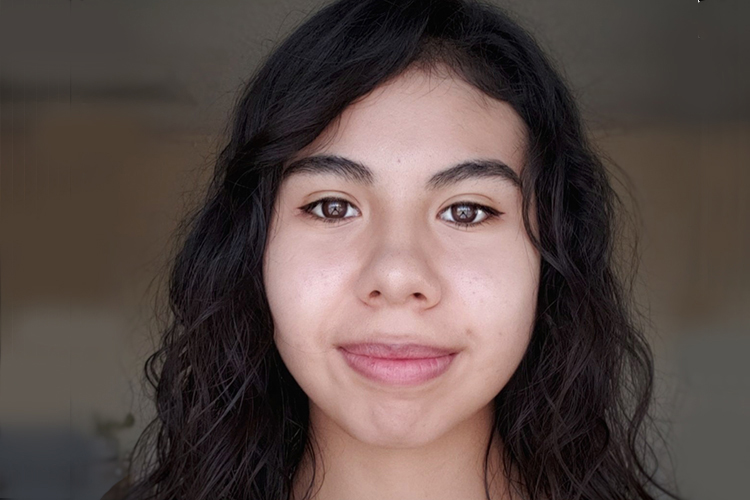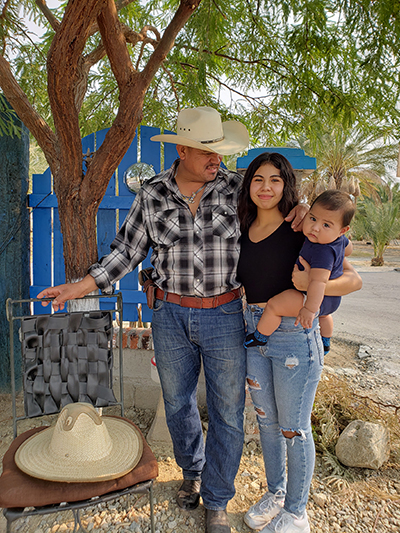I’m a Berkeleyan: Dalia Rangel Perez on breaking the cycle in Coachella Valley
This first-generation Berkeley student longed to move to Berkeley, but despite the pandemic, is still making her family proud — just outside the front door
December 2, 2020

Dalia Rangel Perez is a first-year, first-generation college student at Berkeley this semester. She grew up in Coachella Valley, where her parents are field workers who encouraged her to strive for higher education. (Photo by Dalia Rangel Perez)
My dad, who is a man of many talents, tells me stories of the mountains he had to cross to reach his small school in Mexico. Unfortunately, because of its distance, he dropped out in second grade. Nonetheless, he earned jobs as a baker, construction worker, sales person for clothes and gas and a security guard.
My mother had a different, yet important, job raising her children. Eventually, my dad began crossing to America to work picking fruits and veggies. He lived in his car, eating soup and bread, until he finally decided to move to America permanently, a land that held more opportunities than our land of origin.
Unlike millions of immigrant families, luck was by our side, and we made it to America when I was about one year old, without a single member being left behind.
When I was younger, it was rare that my parents attended a school awards ceremony or a parent teacher conference, not because they were irresponsible, but because they were always working. However, they clearly expressed how critical it was for me to do well in school and graduate — if not from college, then at least from high school.
Despite not knowing what college was, in elementary school I knew I wanted to continue an education after high school to prevent the work cycle that’s often seen here in Coachella Valley: Children in low-income working families either stop seeing the value of school and decide to stop pursuing an education after high school, or are forced to quit to help their parents’ economic situation. Thus, they keep working in the same low-wage jobs their parents work in, staying in poverty, having families of their own and continuing the poverty cycle in the region.
My parents acted as a living reminder of the consequences.
After a long day in the smothering heat, they’d arrive home, covered in mud and smelling like greens, and tell me, ‘This is ugly. It’s horrible. The fields are not easy. Look at how we come home: exhausted, sunburned, joints aching and head throbbing. You have to do well in school, because otherwise you will end up in the same fields.’

Dalia Rangel Perez with her father and her 6-month-old nephew at their home in Coachella Valley. (Photo by Leydy Rangel)
Most of the residents of the valley are field workers. Temperatures can reach 120 degrees in summer. Workers are highly susceptible to collapsing from heat stroke, and many others, like my mom, get frequent headaches. In the winter, early in the morning, some crops are frozen or covered in water. At times, my parents can’t feel their fingertips. Both of them are over 50 and have severe pain from walking, crouching, lifting and carrying multiple pounds of vegetables and fruits.
That is why, upon learning I was accepted to Berkeley, we all celebrated. It was one of the proudest moments in our lives.
My main goal, in college, is to educate myself further on issues that immigrants and minorities face. I also want to participate in research to help low-income communities, to join different clubs and recreational activities, to get involved in pre-law programs.
I’d like to become a paralegal and then attend law school with the dream of becoming an immigration attorney or a lawyer for a corporation working for immigrant rights.
For now, I’m a political science major and am considering minors in ethnic studies or possibly Japanese or Chinese. This semester, I took Intensive Portuguese for Spanish-speakers, and it was one of the most fun classes I’ve had. I’ve always liked learning languages, but was never able, until now, to develop my language skills.
I have never been to Berkeley or the Bay Area, so I was very excited when I got accepted to Berkeley for the change of scenery, culture and community. With the current pandemic, though, I’m living at home. I’m doing well, but in the first couple of weeks, I was unable to participate in my classes because of the major movement and loud atmosphere in my house: A 7-month-old baby, a 4-year-old and a 7-year-old, and two to four adults are not easy to work around, given that we all share the same space.
I moved to Bakersfield for a while, with my sister, where the Internet was better and it was quieter, but she moved recently, so I’m back home, where it’s harder to concentrate and manage my house duties. So, I’ve set up a little space for myself outside the house.
I appreciate Berkeley’s effort to maintain the safety of students. With the current pandemic, everybody’s well-being comes first. But I feel I’m not even a student. It makes work that much harder. I can’t see my professors face-to-face. I’m in some group chats with classmates, but we simply lack physical connection and enthusiasm.
My GSIs are very helpful, though. The professors are, too. During office hours, they’re happy to share their knowledge. And I’m getting advice on writing and formulating essays in an SLC (Student Learning Center) pod.
One benefit to attending remotely is not having to worry about paying for housing and food. My main worry about college was — and still is — paying for it.
Another benefit is that I’ve had the opportunity to share something with my mom that I’d learned in one of my history classes, History 7A. It was about the Mexican War. It was the first time I was taught something about my native country, and it was really, really exciting to me. So, I had to tell my mom what I’d learned. She lived in Mexico, but never got the chance to learn its history in depth.
After the first few weeks of the semester, I wondered if going to Berkeley was more than I could do. I’m a first-generation college student, and I used to hear a lot about imposter syndrome. And when I couldn’t be on campus, because of the pandemic, I was saddened. But I definitely was not discouraged. Deferring or not attending never crossed my mind. One of the things I looked forward to at Berkeley was challenging myself, and I’m adapting. All this rigorous work is going to propel me much more than if I’d gone to a less competitive school.